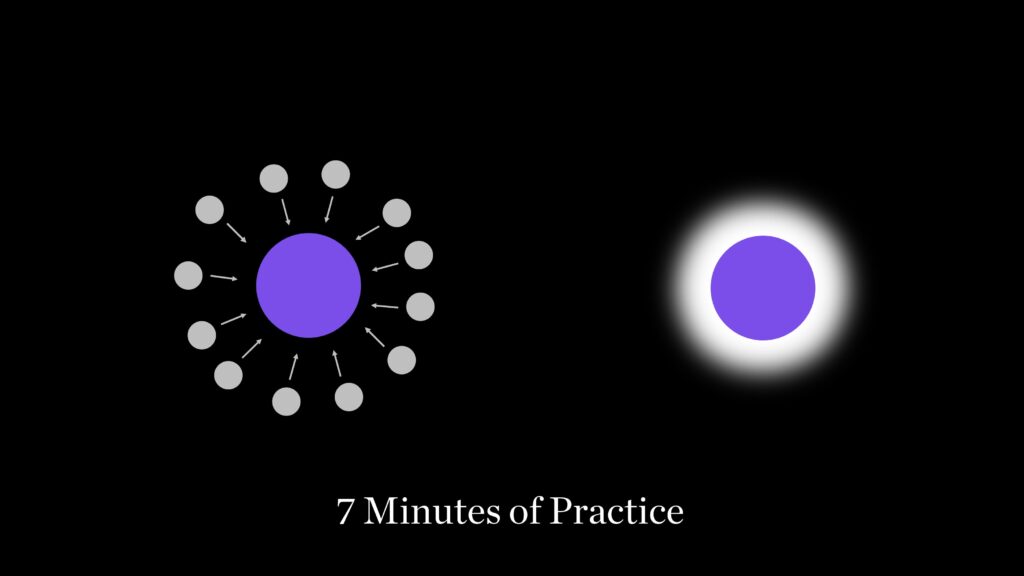Article last updated on January 15, 2022
The practice of stillness is a way to quiet your mind so you can hear yourself think. You learn how to be alone with your thoughts, which allows clarity, and this helps you make more wiser decisions.

Stillness also teaches you about patience.
Patience is not always easy, but if you have the discipline to sit quietly, you will become more patient.
I’ve tried many different ways to meditate, but the one thing they all had in common was that they included the practice of stillness.
It’s a great tool to use, especially if you are an entrepreneur, because it helps you focus on what really matters.
If you want to get more mental clarity and focus, this article is for you.
What Is Stillness?
In the stillness, we find our true selves. In the stillness, our minds become clear.
When we are still, we can listen to ourselves think. We gain clarity when we are still. When we are still, we can see things from a new perspective.
Stillness is a state of mind with no thinking. There is only awareness.
Awareness is the ability to notice something without judgment or reaction.
This is basically the practice of stillness, gaining more awareness and peace of mind.
Why You Need Stillness
In our fast-paced world, we often forget to take care of ourselves. We become so busy doing things that we don’t stop to think about what we really want out of life.
This leads us to feel stressed, anxious, and unhappy.
We need to slow down and take time to relax. If you feel overwhelmed by stress, anxiety, or depression, you should consider taking some time off.
You will notice I am talking primarily about the benefits of stillness because there are so many of them, but I will summarize them into the most noticeable ones.
Stillness lets you be aware of yourself
In stillness, we become aware of our thoughts, feelings, emotions, body sensations, and surroundings. This awareness allows us to choose what we focus on and how we respond to situations.
You’ll increase your self-awareness, both external and internal self-awareness.
There are differences between them; if you haven’t read those two articles about self-awareness, check them out to understand the difference.
Stillness lets you be aware of yourself. For example, if someone criticizes you, you may react negatively. However, if you practice stillness, you might realize that the person isn’t worth responding to. Instead, you could let them go.
You may even come up with a solution to their problem.
You can use stillness as a tool to help you manage your emotions.
When you practice it, you will notice when you feel angry or frustrated. You can then take a moment to calm down before responding.
Stillness allows you to appreciate life
In the moment of stillness, we can see our true nature. We can feel what we truly want. We can let go of everything that holds us back from living the best life we can.
We have the ability to make nonjudgmental observations.
When we practice stillness, we can appreciate the beauty around us. We can enjoy the small things.
We can also appreciate the more important things in life, like family and friends.
We can love ourselves and others. In addition, we can appreciate the things we already have.
We can appreciate the good times and the bad times.
We can appreciate every aspect of life.
Just think about it. If you were to live in a perfect world, would you be happy?
Would you be able to appreciate everything you had? How much happier would you be if you did?
If you answered “yes” to these questions, you know why it’s important to practice stillness.
It helps us appreciate life.
Stillness makes us stronger
Practising stillness strengthens our mental clarity.
If you have ever tried meditating, you probably noticed that you start to get distracted after a while, and you lose focus.
However, if you practice the discipline of stillness consistently, you won’t lose focus and stay focused and clear-headed.
When we are in a state of mental stillness, we are not thinking about anything; we are just being.
When we are in this state, it becomes easier to be mindful. Mindfulness means being aware of our thoughts, emotions, and actions.
Mindfulness allows us to be more present. Being present means being fully engaged in each moment.
Being present means noticing what is happening right now.
It doesn’t mean ignoring the past or future.
Instead, mindfulness means being conscious of what is happening in the present.
So, when you merge mindfulness and stillness, you get a stronger version of mental clarity.
Stillness makes us more confident and assertive
Confidence is based on how we feel inside. If we feel positive and strong, we tend to act positively and confidently.
On the other hand, if we don’t feel confident, we act insecurely and timidly.
Stillness gives us confidence. When we are in a state where nothing else matters, we become more confident.
Our body language changes too. Our posture changes, we stand taller, and we look more relaxed.
Our voice tone changes. We speak louder and we speak more confidently.
We walk differently. We move faster, and we make eye contact. We smile more often.
All these things happen when we are practicing stillness.
All these things help you mould yourself into having an assertive personality.
You become an unshakable person.
Stillness makes you more patient
Patience is one of those qualities that people admire most in someone.
Patient people usually seem calm and collected. They always remain composed, even under pressure. They are never angry or upset, and are always ready to listen.
As a result, you can think in the long term and build your business on a solid foundation.
Most people want to be successful. But they fail to realize that success comes from consistency and patience.
Most people take time to develop patience.
And yet, some people appear to be born with patience.
You can become like that if you do the work, and here’s how to do it.
How To Start Practicing Stillness
I recommend starting by practising stillness in the morning before you start your day.
This will give you a chance to connect with yourself and your body. It will help you wake up without social media and email distractions.
It takes only 7 minutes to do it.
The process
Start by sitting quietly in a comfortable position.
Put the timer on your phone for 7 minutes.
Close your eyes. Take several deep breaths.
Relax your shoulders and notice your bodily sensations for the next minute or two.
Feel your feet touching the ground.
Imagine that your mind is empty. Imagine that you are completely alone.
Let go of all the worries and concerns that might have bothered you during the night.
Just let them go. Let everything go.
Now, imagine that you are standing in front of a mirror. Look at yourself.
Notice your face, your hands, your legs, your arms. Observe every part of your body.
Notice how you breathe, how your breath flows through your nose, mouth, and lungs.
Focus on your breathing.
Let go and then open your eyes when your phone starts buzzing.
That’s it!

Did you think it would be some complicated process where you needed to chant some mantra, do a yoga headstand, or do something crazy? Not at all.You just want to get in tune with yourself, and that’s all.
In short, this is how you can prepare yourself for stillness:
- Find a place where you won’t be disturbed.
- Put your phone on airplane mode.
- Set the timer for 7 minutes.
- Sit down comfortably.
- Close your eyes.
- Clear your mind.
- Observe your breath.
- Relax.
- When you’re done, open your eyes.
Here are some common problems you might have:
Reject distraction
Distraction is the enemy of stillness. If we want to master our minds, we must reject distractions.
Distractions include social media, news feeds, email, phone calls, and any other activity that pulls us away from what matters most.
Put your phone on airplane mode, set the timer for 7 minutes and sit by yourself.
The first two minutes are just to relax, and the next five will be actually to do stillness practice.
Seek out solitude and a quiet place
It will be hard to relax if you are in a noisy environment. Seek out a quiet place where you feel relaxed.
If you don’t find such a place, try to create one.
Create an environment where you can focus on your thoughts and feelings.
Find a spot where you can meditate.
Create a space where you can disconnect from the outside world.
Make it a daily discipline
Daily discipline is the most powerful tool to create a long-lasting habit for something.
So, make sure you do this every day.
Don’t skip days, and doing it once won’t make much difference. Do it every day, and eventually, you’ll see results.
I’ve been doing this for quite a while now, almost five years, and it is like second nature to me to sit for seven minutes and just get in tune with myself.
Practice makes perfect
As I said earlier, it will take time to develop the ability to stay focused.
But, keep doing it until you get good at it.
Eventually, you’ll be able to maintain your concentration in your everyday life, even while driving a car or listening to music.
Over time, you’ll learn to control your mind and gain more clarity.
FAQ For The Practice of Stillness
Here are some questions you may ask yourself before and after you start practicing stillness.
What happens if I stop practicing stillness?
When you stop practicing stillness, nothing bad will happen, and you will return to your default state before you started with the practice of stillness. But when you think about it, the benefits of doing it are far more significant than simply stopping it.
How often should I practice stillness each day?
You should practice stillness every day for 7 minutes.
What about meditation? Is it the same as stillness?
Meditation is a different type of exercise. While stillness focuses on clearing your mind as fast as possible, meditation practices focus on more prolonged periods.
How long can I expect to practice stillness?
It depends on your level of commitment and the benefits of doing it. If you become a more focused, calm, and assertive person because of a simple practice of stillness, why would you ever stop?
Why not just read books instead of sitting there?
Books are great, but they require your attention, which means you are distracted by something else.
Stillness allows you to clear your mind without any distractions. It is to get in tune with yourself and not consume additional information.
Can I use headphones during the practice of stillness?
If you are in a quiet environment, I will not use them, but if you are in a noisy environment, then yes, you can listen to music while doing stillness. Just remember the core intention of doing the stillness.
What is the feeling of stillness?
There’s no correct answer here. Everyone has their own experience of what stillness feels like.
For me, it feels like my brain is empty, and I am just observing everything around me.
Most people feel relaxed and refreshed afterwards.
What if I don’t feel any benefit from stillness?
That doesn’t mean that you shouldn’t try it out. There might be other things going on in your life that cause stress.
In those cases, you need to find the root causes of your problems and fix them first. Then, and only then, can you start practising moments of stillness. Otherwise, you will never see results.
How can I be comfortable with stillness?
You have to understand that stillness is not a passive activity and requires effort.
It takes practice. So, you need to make sure that you keep up with it consistently.
Stillness does not work well with noise. If you are surrounded by too much noise, you will not be able to focus on one thing.
When trying to do something, you need to concentrate on it. If you are distracted by something, you won’t be able to perform well.
Is there a way to measure how good I am at stillness?
Yes. This is the whole point of practicing stillness. You want to know whether you are improving or not.
To measure your progress, you can check your ability to focus.
Are you as easily distracted as before? Or, are you now able to focus on one task for longer periods of time?
If you are noticing improvements, then you are doing well.
Conclusion
Doing stillness is an important part of anyone’s daily routine, and it helps you stay focused and calm.
It also allows you to clear your mind and think clearly.
In a world full of distractions, become a person who is aware of his surroundings and makes wise decisions.
So, if you haven’t done it yet, give it a shot!


